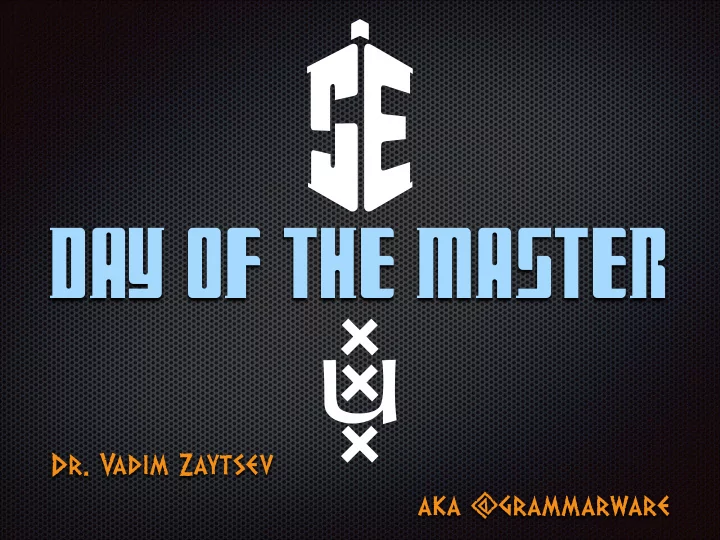

Day of the Master Dr. Vadim Zaytsev aka @grammarware
Introduction Universiteit van Amsterdam (2013 – 2014) Centrum Wiskunde & Informatica (2010 – 2013) Universität Koblenz-Landau (2008 – 2010) Vrije Universiteit Amsterdam (2004 – 2008) Universiteit Twente (2002 – 2004) Rostov State Transport University (1999 – 2008) Rostov State University (1998 – 2003) Vadim Zaytsev
�������� ����������� One year Master of Science programme at UvA Drifted away from computer science We teach software construction, evolution, testing, architecture, process, requirements engineering, etc Programmer in, software engineer out http://www.software-engineering-amsterdam.nl
From code-monkey… Ogrons in Day of the Daleks http://anewviewonolddoctorwho.files.wordpress.com/2013/01/ogrons.png
…to the Master Roger Delgado as The Master in The Claws of Axos http://www.eyeo ! orus.org.uk/images/photo/03pertwee/clawsaxos/master-delgado.jpg
Engineering? Science solves problems Engineering solves problems
Gürbüz Do ğ an Ek ş io ğ lu, http://www.gurbuz-de.com/merdivenler-e.html
Gürbüz Do ğ an Ek ş io ğ lu, http://www.gurbuz-de.com/merdivenler-e.html
Gürbüz Do ğ an Ek ş io ğ lu, http://markovart.wordpress.com/2014/01/03/surrealism-by-gurbuz-dogan-eksioglu/
What is important in ! �������� ����������� ! ?
What’s important? Domain analysis Educated choices Tradeoff awareness Human factors Communicating with management (collected during the workshop)
“I’m not a great programmer, I’m just a good programmer with great habits” –Kent Beck Martin Fowler, Kent Beck, John Brant, Refactoring: Improving the Design of Existing Code , 2012. P . 97.
�������� ����������� One year Master of Science programme at UvA Drifted away from computer science We teach software construction, evolution, testing, architecture, process, requirements engineering, etc Programmer in, software engineer out http://www.software-engineering-amsterdam.nl
Coding Dojo
Zurfa, Hacker Dojo - Main Classroom, CC-BY-SA, 2013.
Wang Ming, Noma Dojo, 2006, CC-BY-SA, 2007.
The Doctor fencing with The Master, The Sea Devils , s09e03.
The Doctor fencing with The Master, The Sea Devils , s09e03.
Warm-up!
Henry Ernest Dudeney Recipe (1924): take a numerical calculation (2*2=4) replace digits by letters (A*A=B) Results in: cryptarithm http://www.cut-the-knot.org/cryptarithms/st_crypto.shtml http://en.wikipedia.org/wiki/File:Henry_Dudeney.jpg
James Hunter, 1955 Cryptarithm with numbers as meaningful words equations as meaningful phrases Results in alphametic http://www.cut-the-knot.org/cryptarithms/st_crypto.shtml http://www.amazon.com/Mathematical-Brain-Teasers-James-H-Hunter/dp/0486233472
Send Mode Money! SEND 9567 + + MORE 1085 MONEY 10652
No Gun No Hunt! NO 87 + + GUN 908 NO 87 HUNT 1082
Will Obey Dalek! WILL 6099 + + OBEY 7825 DALEK 13924
! E T A N I M ! E T A R N I M E R E T T X E X E EXTERMINATE + MONEYMAKING CRYPTARITHM
� � � Tasks � Find a solution of an alphametic cryptarithm puzzle Given a puzzle, find a solution Given a puzzle and a solution, check compatibility Find a puzzle with only one solution Given a desired word, find valid puzzles Tomchen1989, Cburnett et al, Poker current event.svg, 2011. CC-BY-SA.
do you know Yes the difference No between loop and recursion?
ds = {*[0..9]}; for (str solution <- {" <N> <O> ' <G> <U> <N> ' <N> <O> ‘ ------------------------ ' <H> <U> <N> <T>" | int G <- ds, int H <- ds - {G}, int N <- ds - {G,H}, int O <- ds - {G,H,N}, int T <- ds - {G,H,N,O}, int U <- ds - {G,H,N,O,T}, G != 0, H != 0, N != 0, (O + 10 * N) + (N + 10 * U + 100 * G) + (O + 10 * N) == (T + 10 * N + 100 * U + 1000 * H)}) println(solution);
str gen(list[str] xs) { keys = sort({x | /str s <- xs, int x <- chars(s)}); int width = 4*max([size(s) | /str s := xs])+3; f = "module Solver 'import IO; 'void solveit(){ 'ds = {*[0..9]}; 'for (str solution \<- {\"" + intercalate(" ' \'", [right(intercalate(" ",["\<<stringChar(c)>\>" | int c <- chars(s)]),width) | s <- sx[..-1]])+ " ' \'"+ right("",width,"-")+" ' \'"+ right(intercalate(" ",["\<<stringChar(c)>\>" | int c <- chars(xs[-1])]),width)+ ” \ ” | \n"; visited = []; for (k <- keys) { f += " int <stringChar(k)> \<- ds - {<intercalate(",",visited)>},\n"; visited += stringChar(k); } notzeros = sort({chars(s)[0] | /str s <- xs}); f += "\t"+intercalate(", ",["<stringChar(c)> != 0" | c <- notzeros]) + ", ' <intercalate(" +\n",["(<factorise(s)>)" | s <- xs[..-1]])> == ' (<factorise(last(xs))>)}) ' println(solution); '} 'public void main(list[str] args) {solveit();}"; println(f); return f; }
Helping observations Leftmost letters cannot be 0 The result cannot be too long or too short If the result is longer, its left digit is 1 No puzzle can contain more than 10 different letters Brute force solution can be optimised exclude obviously wrong hypotheses
Lessons leant Recursion of known max depth can be rewritten as nested loops Harder tasks can be made simple by solving subtasks Easier tasks can be inefficiently solved by reuse Small differences in requirements matter (collected during the workshop)
SLOC
Lines of Code? Count the number of lines of source code in a file Disregarding indentation and whitespace empty lines comments
Solution Looping over lines Trimming/stripping Regular expressions for comments trouble with combinations of //, /* */ and “”
Regular languages below context free in the Chomsky hierarchy! ���������������������� ����������������� ������������ ������� Duncan Rawlinson, Chomsky.jpg, 2004, CC-BY. J. Finkelstein, Chomsky-hierarchy.jpg, 2010, CC-BY-SA.
Regular expressions Stephen Kleene invented regexps in 195x Ken Thompson added them to ed & grep POSIX standard since 1993 PCRE by Philip Hazel (stable release Dec. 2013) Konrad Jacobs, S. C. Kleene, 1978, MFO. Archetypal hackers ken (left) and dmr (right).
Regular expressions Stephen Kleene invented regexps in 195x Ken Thompson added them to ed & grep POSIX standard since 1993 PCRE by Philip Hazel (stable release Dec. 2013) Konrad Jacobs, S. C. Kleene, 1978, MFO. Archetypal hackers ken (left) and dmr (right).
Lessons leant Perfect solutions are sometimes provably impossible “ Close enough ” solutions are useful Science: definitive proofs Engineering: constant incremental advancements Ultimate reuse: find a suitable tool Metrics should not be abused (careful reporting) (collected during the workshop)
Grammars
Recommend
More recommend